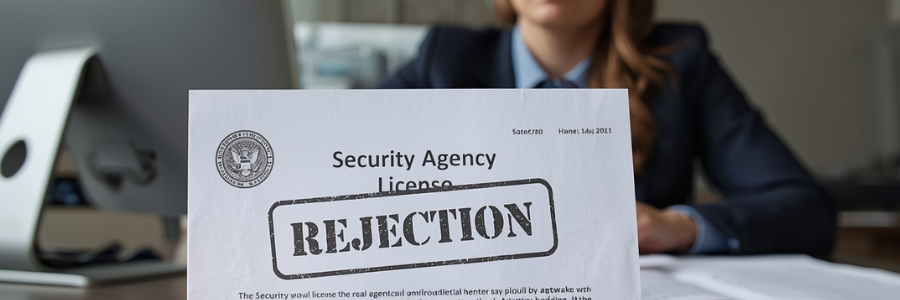Beginning a Private Security Company in India: Legal Roadmap and Tips
Let’s say you have everything you need to launch a private security firm, but you eventually run into legal problems. This is because, to operate any agency in India, the primary requirement is to gain legal recognition. The applicant had to adhere to the established legal rules and regulations at the time of the establishment of the new agency. In short, legal compliance is the backbone of a security agency’s business. Let’s take a look at this guide to explore how you can start a legal private company in India.
1. Understanding the Private Security Industry in India
The economic expansion and urbanization are the two major factors for the increase in private security agencies in India. Such an agency holds significant potential for creating major employment. These types of agencies provide a wide range of services, mainly including guarding, electronic surveillance, and cybersecurity. However, despite having the strongest private security agencies in India, this sector faces a lot of challenges. The lack of standardized training for miscellaneous roles and problems is one of these difficulties. To resolve these challenges, the Government of India has mandated the compulsory PSARA registration. The Private Security Agencies (Regulations) Act permits the mandatory agencies to comply with the current mandatory training framework outline.
2. Legal Roadmap for Starting a Private Security Company in India
The first step in establishing a private security agency in India is to register the company with the governing body of a particular state. Start the security agency establishment journey as
I. Initial Compliance and Registration of Businesses
Start the journey of your private security agency by establishing it with the right business structure. Must register as either a private limited company, LLP, or partnership. Securing the necessary registrations is important. The Permanent Account Number (PAN) and registration for Goods and Services Tax (GST) are important. The registration of the agency under the Shop and Establishment Act is vital. The ESI registration is also necessary if the agency employs more than twenty people. In case you are providing the armed guards training, securing the arms license from the state’s authority is necessary.
II. PSARA License Requirements
Upon the successful establishment of the private security agency, the next step is to obtain the necessary license. Among them, the most important and legally recognized license is PSARA. The agency’s personnel must meet the police verification requirements, which are required to ensure the background records. Signing the MOU with a state government training institute is compulsory. Verifying that the guards have received the required instruction and certification is essential. To avoid the license delays, get all the documents in advance, including identity proof, affidavits, and the MOU.
III. Ongoing Legal Compliances
To meet the ongoing compliance requirements, the maintenance of employee records, background checks, and employment history for inspection is required. Must align with all labor law compliance and provide the ESI and PF benefits. To remain compliant with updated regulations, one must renew the PSARA license before expiry.
Learn More: Role of a PSARA License Agent in Simplifying Security Agency Registration
3. PSARA License: The Core Requirement
Before beginning the security agency registration, it is important to confirm that you have fulfilled the PSARA license criteria. Every state authority has its own controlling authority with authority over the lawful regulations and implementation. Generally, with each one of them:
- Registration Format: The private security agency must be legally registered with the proper form of entity. It needs to be a sole proprietorship, partnership firm, LLP, or private limited company.
- Indian Citizenship: The directors and shareholders must be Indian nationals and have proper unique identification (UID).
- Background Checks: To ensure clean criminal records, the agency’s personnel and the agency itself undergo the mandatory police verification.
- Financial Stability: The agency must have a financial capacity to execute the day-to-day business. In order to demonstrate financial capability, the business must provide income tax returns and bank statements.
- Training Commitment: A Memorandum of Understanding (MOU) must be signed with a training facility that has received PSARA approval. It is required to provide the training to all the agency’s personnel. The aim of training is to focus on physical fitness, crowd control, and first aid.
4. Supported Documents for Security Agency Registration Process
The several records required to launch a private security firm is as follows:
- Incorporation/Registration Certificate
- PAN card & certificate of GST registration
- PF and ESI registration certificate
- Certificate of Business and Shop License
- Labor Act Registration
- Copies of ITR (Income Tax Returns)
- For businesses, the MOA and the AOA
- Partnership deed for partnership firms
- Address proof and NOC (No Objection Certificate)
- Passport-sized photo and proof of identity
- MoU and character certificate
- Affidavit, Arms license, and agency logo
5. The Legal Registration for PSARA License
Obtaining a private security license gives you the legal right to conduct business in a particular area. This is a meticulous focus demonstrating how to get the license:
Step 1: Compile the Records
Collecting all documents in advance increases the speed of license approval. Must schedule all the essential documents, such as a certificate of incorporation for business registration proof, identity, and address proof of stakeholders and directors. To provide the training to your security personnel, you must sign the Memorandum of Understanding with a government-recognized training institute.
Step 2: Filing of Application
During the registration procedure, the three main forms required are the PSARA application (Form I), for antecedent verification, Form II, and an affidavit, which needs to be submitted to the respective state’s supervising administration in Form III. Ensure that your state’s controlling authority offers the online application registration service or not.
Step 3: Undergo Police Verification
To clear the background checks of the agency and its directors, the authority will conduct a police verification process. Upon police verification, you will receive the NOC (No Objection Certificate) from the police, which is a mandatory document during the license approval.
Step 4: PSARA License Approval
Upon the successful police verification, the submitted documents and the application form will be reviewed by the state’s controlling authority. If everything goes according to the set steps, you will get the PSARA security registration certificate.
Note: If you are seeking to operate the agency in multiple states, you must get a separate license for each state.
Tips for Successfully Running a Private Security Agency
To run a successful private security agency, the business must follow these tips:
- Tip 1: Obtain all necessary registration certificates, such as the PSARA license.
- Tip 2: Conduct the background checks for all owners and employees.
- Tip 3: Must keep accurate records of employee training and background checks.
- Tip 4: Make a clear and satisfactory service agreement.
- Tip 5: To ensure compliance continues, apply for the PSARA license renewal on time.
- Tip 6: Hire staff who meet strict eligibility criteria.
- Tip 7: Provide strict training and hire a supervisor for security personnel
- Tip 8: Create a business plan and establish a physical office.
- Tip 9: Must have adequate financial resources
- Tip 10: Maintain operational communication with the clients and security guards.
Conclusion | The Legal Roadmap for Private Security Companies
Following a legal and structured framework helps to gain significant credibility in competitive places. It ensures that you are aligned with all legal laws and regulations. In essence, having a legally registered private security agency makes the business operation smooth and approachable. The PSARA registration certificate, which is used by the private security agencies, enhances reputation, builds trust with clients, and is often required for contracts. To gain the standardization and accountability, register now for the private security license. Make your starting private security company journey transparent and legally sound with LegalRaasta professionals. We assist you throughout the registration process.










